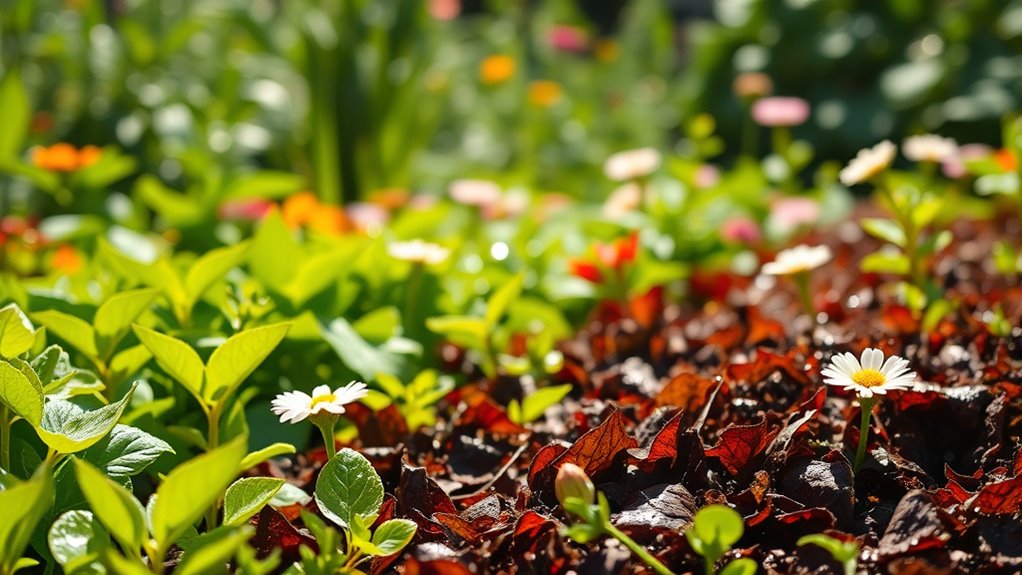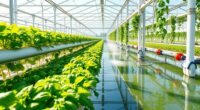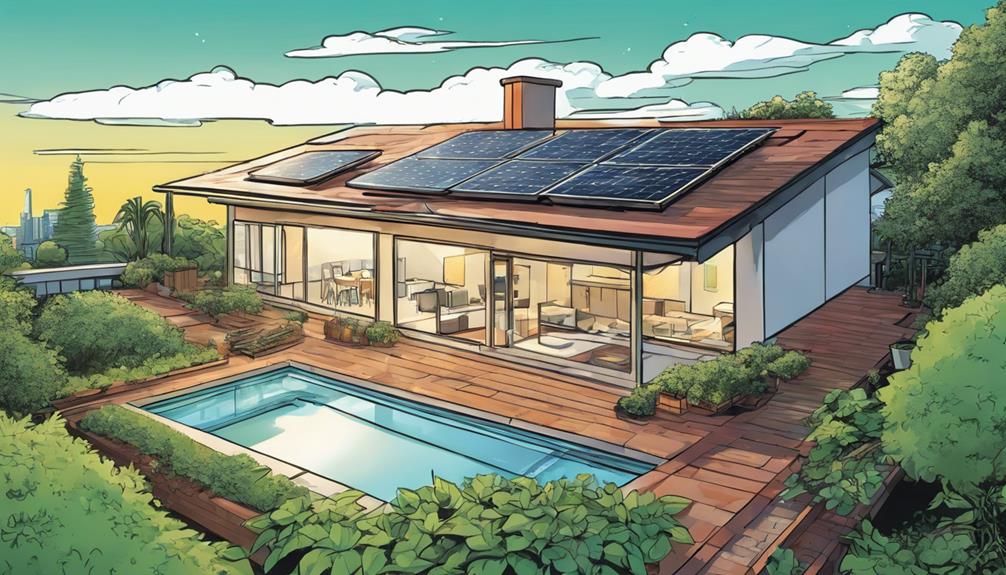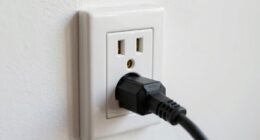If you're looking for the best mulch films to enhance your gardening experience in 2025, I've got some great options to evaluate. From durable poly mulch films, like the 48-wide and 4000-long, to eco-friendly biodegradable options, there's something for every garden. For effective weed control and moisture retention, check out red plastic mulch or black sheets with holes designed for planting. Stick around, and you'll discover even more valuable insights to elevate your gardening game!
Key Takeaways
- Consider thickness: Choose mulch films with at least 1.5 mil thickness for effective weed suppression and durability during the growing season.
- Explore biodegradable options: Eco-friendly mulch films break down naturally, reducing plastic waste and enhancing soil health over time.
- Select the right material: Polyethylene films offer durability, while biodegradable options provide sustainability; choose based on your gardening priorities.
- Evaluate sunlight exposure: Black mulch warms soil effectively, while red mulch enhances light transmittance, improving plant growth and yields for specific crops.
- Ensure proper installation: Prepare soil thoroughly, secure edges, and cut planting holes to maximize the effectiveness of the mulch film throughout the growing season.
Poly Mulch 48 Wide 4000 Long 1.25 mil Thickness
If you're looking for a reliable mulch solution, the Poly Mulch measuring 48 inches wide and 4000 inches long is an excellent choice for gardeners, especially those working with sandy soil under full sun conditions. This 1.25 mil thick black mulch from Farm Plastic Supply is strong and durable, making it perfect for outdoor use. Plus, it's deer resistant, which is a huge bonus for protecting your plants. I've found that it not only helps retain moisture but also suppresses weeds effectively. With a stellar 5-star rating, it's no wonder this mulch is a popular choice among gardeners like us!
Best For: Gardeners looking for a strong, durable, and deer-resistant mulch option suitable for sandy soil in full sun conditions.
Pros:
- Strong and Durable: Made from high-quality materials, ensuring longevity and effectiveness.
- Deer Resistant: Protects plants from deer, making it ideal for gardens in areas with wildlife.
- Weed Suppression: Effectively suppresses weeds while helping retain moisture in the soil.
Cons:
- Limited Color Options: Only available in black, which may not suit all garden aesthetics.
- Not Biodegradable: Unlike organic mulches, this poly mulch does not break down over time, leading to potential environmental concerns.
- Requires Careful Installation: May need careful handling during installation to avoid tearing or damage.
Farm Plastic Supply Poly Mulch Black Plastic Sheeting (3 x 100)
For gardeners looking to enhance their growing conditions, the Farm Plastic Supply Poly Mulch Black Plastic Sheeting (3 x 100) stands out as an excellent choice. Its 1.5 mil thickness provides high tensile strength, preventing ripping and keeping soil intact. The UV stabilization protects crops while creating a greenhouse effect that warms the soil and retains moisture. I've found it particularly effective for mulching aisles in vegetable gardens and protecting newly planted trees. Plus, it's affordable and easy to use, even in hot, sunny conditions. I noticed positive results just a month after installation—definitely a worthwhile investment for any gardener!
Best For: Gardeners and agricultural enthusiasts looking to improve soil conditions and protect their crops.
Pros:
- High tensile strength prevents ripping and keeps soil in place.
- UV stabilization creates a greenhouse effect that warms soil and retains moisture.
- Affordable and easy to use, even in hot, sunny conditions.
Cons:
- Limited to only one color option (black), which may not suit all aesthetic preferences.
- Thickness of 1.5 mil may not be suitable for very heavy-duty applications.
- Requires careful installation to ensure maximum effectiveness and longevity.
BioDegradable Plastic Mulch Film – Black – Eco-One OXO
Gardeners looking for an eco-friendly solution will find the BioDegradable Plastic Mulch Film – Black – Eco-One OXO particularly appealing. With dimensions of 4 ft. x 600 ft. and a thickness of 0.5 Mil, it's designed for initial soil warming and weed suppression. However, I've noticed that it doesn't hold up well against persistent weeds and can tear easily, especially when staked. While it breaks down within a month, I recommend using it with drip irrigation and covering it with organic mulch for better durability. Overall, it's a mixed bag, but I appreciate its biodegradability at season's end.
Best For: Eco-conscious gardeners seeking an initial solution for soil warming and weed suppression without the hassle of disposal at season's end.
Pros:
- Biodegradable, eliminating disposal concerns at the end of the season.
- Effective for initial soil warming and weed suppression.
- Can be used with drip irrigation and allows for planting holes.
Cons:
- Tears easily and is described as flimsy, especially when staked.
- Breaks down within a month, making it ineffective for long-term weed control.
- Mixed user reviews regarding durability, with some recommending a thicker option.
Red Plastic Mulch Garden Film (4ft X 25ft)
The 4ft x 25ft Red Plastic Mulch Garden Film is an excellent choice for those looking to enhance the growth of strawberries, tomatoes, and peppers. Its 2 Mil thickness and embossed design help absorb sunlight, warming the soil effectively. I've noticed improved yields in my garden thanks to this film. While some users mentioned it feels thinner than expected, I found it does a decent job of reducing grass growth and promoting fruit production. However, I recommend creating perforations for better water drainage. Overall, it's a solid option, especially for colder climates where soil warmth is essential.
Best For: Those looking to enhance the growth of strawberries, tomatoes, and peppers, particularly in colder climates.
Pros:
- Promotes increased crop yields by warming the soil and enhancing fruit production.
- Reduces grass growth by effectively blocking sunlight.
- Embossed design increases light transmittance compared to black mulch.
Cons:
- Some users find the film thinner than expected, raising concerns about durability.
- Lack of perforations for water drainage may require manual adjustments.
- Mixed effectiveness as a weed barrier, with some users reporting weed growth beneath the film.
Biodegradable Mulch Film, Natural Weed Control for Gardens & Farms (48X100)
If you're looking for an eco-friendly solution to enhance your garden while keeping weeds at bay, the Biodegradable Mulch Film (48X100) is your go-to option. This film is perfect for gardens, flower beds, and vegetable patches, made from fully biodegradable materials. I love how it naturally suppresses weeds, saving me time and effort without using harsh chemicals. Plus, it encourages rapid root growth, leading to healthier plants and better yields. Installation is a breeze—just unroll, cut, and fit it to your space. Best of all, it decomposes naturally, leaving no waste or residue behind. Happy gardening!
Best For: Gardeners and farmers looking for an eco-friendly solution for weed control and plant health improvement.
Pros:
- Naturally suppresses weeds without the use of harsh chemicals, making it safer for the environment.
- Encourages rapid root growth leading to healthier plants and potentially better yields.
- Easy to install and decomposes naturally, leaving no waste or residue.
Cons:
- May require replacement more frequently than traditional plastic mulch, depending on environmental conditions.
- Performance can vary based on soil type and moisture levels.
- Limited availability compared to conventional plastic mulch options.
Hand-Pulled Mulch Film Machine for Agriculture
For anyone looking to streamline their mulching process, the HNSYPX Hand-Pulled Mulch Film Machine stands out as an ideal solution. This multifunctional tool makes automatic mulching a breeze, whether you're in a greenhouse, vegetable garden, or orchard. I love that I can adjust the depth and width of the mulch simply by tweaking the front wheels. It saves me time by covering the soil without manual bending. However, it works best on soft soils, so keep that in mind. Overall, this machine has improved my gardening experience, ensuring better soil temperature and moisture retention while reducing pesky weeds.
Best For: Those looking to enhance their gardening efficiency and improve soil conditions in soft soil environments.
Pros:
- Saves time by automating the mulching process without the need for manual bending.
- Adjustable depth and width settings allow for customized mulching to suit different crops and soil types.
- Improves soil conditions by enhancing temperature, moisture retention, and reducing weed growth.
Cons:
- Not suitable for hard ground or large clods of dirt, limiting its use in certain soil conditions.
- 20kg mulch film and folded mulch film cannot be used with this machine, restricting film options.
- Requires adjustments before operation, which may take additional setup time.
3 Mil Embossed Red Mulch Garden Plastic Film (4ft X 25ft)
Looking to boost your garden's productivity? The 3 Mil Embossed Red Mulch Garden Plastic Film is a fantastic choice. Measuring 4ft x 25ft, it's made of durable, tear-resistant polyethylene. I love how it reflects red light, enhancing photosynthesis and speeding up plant growth. It effectively blocks weeds, making it perfect for strawberries and tomatoes. While some users noted color fading, I found it still enhances fruit production. With an average rating of 3.5 stars, it's worth considering. Plus, Adnee offers great customer service and support for any concerns. Give it a try for a thriving garden!
Best For: Gardeners looking to enhance plant growth and reduce weed competition, especially for crops like strawberries and tomatoes.
Pros:
- Reflects red light to boost photosynthetic capacity, promoting faster plant growth.
- Durable and tear-resistant construction ensures long-lasting use in various gardening conditions.
- Effectively blocks weeds, reducing competition and allowing for healthier crop yields.
Cons:
- Some users reported color fading over time, which may affect aesthetic appeal.
- Mixed reviews on its effectiveness, with some experiencing weed growth underneath the film.
- The color has been described as "hot pink" rather than true red, leading to potential color accuracy concerns.
Bio-Degradable Plastic Mulch Film by Growerss Solution (4 ft. x 50 ft.)
Gardeners seeking an eco-friendly solution will find the Bio-Degradable Plastic Mulch Film by Growerss Solution to be an ideal choice. Measuring 4 ft. by 50 ft. and with a thickness of .5 mil, this black Eco-One film fits perfectly over both raised and flat beds, enhancing your plants' growing conditions. I appreciate how easy it is to install, and it effectively controls weeds without breaking down into harmful BPA or nanoplastics. With an average rating of 4.6 stars, it's a budget-friendly option that's been well-received by fellow gardeners. Plus, warranty information is readily available for peace of mind.
Best For: Gardeners looking for an eco-friendly and effective solution for weed control in their gardens.
Pros:
- Easy installation makes it user-friendly for gardeners of all skill levels.
- Effectively controls weeds without the use of harmful chemicals.
- Biodegradable nature ensures no harmful residues are left behind in the soil.
Cons:
- Limited dimensions may not suit larger garden areas without multiple rolls.
- Thickness of .5 mil may be less durable compared to thicker plastic options.
- Average customer rating of 4.6 stars indicates some variability in user satisfaction.
Black Eco-One OXO Degradable Mulch Film (4 ft. x 100 ft.)
The Black Eco-One OXO Degradable Mulch Film (4 ft. x 100 ft.) stands out as an excellent choice for organic gardening enthusiasts who prioritize sustainability. This 0.5 Mil thick film is designed to provide a tight fit over both raised and flat beds, enhancing growing conditions for your plants. While it's been used successfully for several years, keep in mind that customer feedback has been mixed, with some expressing dissatisfaction due to animal damage. Despite this, I believe its eco-friendly attributes make it worth considering for your gardening needs, especially if you're looking to reduce plastic waste.
Best For: Organic gardening enthusiasts looking for an eco-friendly option to reduce plastic waste in their gardening practices.
Pros:
- Eco-friendly: Made from degradable materials, reducing environmental impact.
- Versatile: Suitable for both raised and flat garden beds, providing flexibility in use.
- Improves growth conditions: Helps maintain soil temperature and moisture for better plant growth.
Cons:
- Mixed customer feedback: Some users reported dissatisfaction due to issues with animal damage.
- Low customer rating: Currently holds a 1.0 out of 5 stars, indicating potential quality concerns.
- Limited warranty information: May require additional research to understand warranty details.
2 Mil Red Plastic Mulch for Strawberries and Vegetables (4FTx25FT)
For those cultivating strawberries and a variety of vegetables, the 2 Mil Red Plastic Mulch (4FTx25FT) stands out as an ideal solution. This mulch enhances photosynthesis, creating a mini-greenhouse effect that keeps the soil warm and moist. It effectively blocks weeds, allowing my plants to thrive without competition. While I've noticed mixed reviews regarding its thickness and color accuracy, its benefits for crops like tomatoes and peppers are undeniable. Just a heads up—be cautious when applying fertilizers, as the mulch covers plant bases. Overall, it's a handy tool in my gardening arsenal!
Best For: Home gardeners looking to enhance the growth of strawberries and various vegetables while managing weeds effectively.
Pros:
- Enhances photosynthesis by filtering sunlight and providing the necessary light spectrum for plant growth.
- Creates a mini-greenhouse effect, maintaining warmer soil temperatures and extending the growing season.
- Blocks weed growth, reducing competition for plants and simplifying garden management.
Cons:
- Mixed reviews on thickness, with some users finding it thinner than expected and needing to double layer.
- Color accuracy issues, as some customers reported receiving pink instead of red mulch.
- Durability concerns, including rapid fading of the red color and overall quality dissatisfaction.
Garden Vegetable Mulch Film (5 Holes, 311×32 FT)
When you're looking to enhance your vegetable garden, the Garden Vegetable Mulch Film (5 Holes, 311×32 FT) stands out with its pre-cut planting holes that save you time and effort. This high-quality polyethylene film effectively blocks sunlight, inhibits pesky grass growth, and creates the perfect environment for your vegetables and fruits. The 45mm holes guarantee ideal spacing of 15cm, making planting a breeze. Plus, it controls soil temperature and humidity, reduces water evaporation, and even beautifies your garden. I've found it simple to use, making it a practical choice for any gardening enthusiast. You won't regret it!
Best For: Gardeners and agricultural enthusiasts looking to enhance plant growth and simplify the planting process with an effective mulch solution.
Pros:
- Blocks sunlight, inhibiting unwanted grass growth and weeds.
- Pre-cut holes save time and effort during planting.
- Controls soil temperature and humidity, promoting healthier plants.
Cons:
- Limited to specific plant spacing, which may not suit all gardening styles.
- Plastic material may not be biodegradable, raising environmental concerns.
- Initial cost may be higher compared to traditional mulching methods.
Mulch Film with 5 Holes for Gardening
Gardening enthusiasts looking to maximize their plant health will find that mulch film with 5 holes is an excellent choice. Made from high-quality polyethylene, it effectively controls soil temperature and humidity while reducing water evaporation. The micropores prevent weed growth, allowing for proper aeration and watering. Plus, the pre-cut 45mm holes save time, giving you the perfect plant spacing of 15cm. This versatile mulch film not only enhances growth conditions but also protects your garden's ecosystem. Overall, it's a fantastic tool for promoting healthier harvests and improving efficiency in your gardening practices. You won't regret making this investment!
Best For: Gardening enthusiasts and farmers looking to enhance plant health and streamline their gardening practices.
Pros:
- Reduces water evaporation and maintains optimal soil temperature and humidity.
- Pre-cut holes save time and ensure consistent plant spacing of 15cm.
- Prevents weed growth while allowing soil aeration and watering through micropores.
Cons:
- Limited to specific plant spacing, which may not suit all gardening layouts.
- May require careful installation to ensure proper coverage and effectiveness.
- The material may degrade over time with prolonged exposure to sunlight.
HFS Plastic Sheeting Roll 6 MIL Black (10FTx25FT)
If you're looking for a reliable solution to tackle weed control and maintain soil moisture in your garden, the HFS Plastic Sheeting Roll 6 MIL Black (10FTx25FT) is an excellent choice. This heavy-duty polyethylene sheeting is both waterproof and weather-resistant, ensuring durability in various conditions. Weighing just 7.7 pounds, it's easy to handle yet tough enough to resist tearing. I appreciate its versatility; I've used it for everything from garden beds to greenhouse coverings. Plus, it's reusable and recyclable, making it an eco-friendly option. With a solid customer rating of 4.6 stars, it's clearly a favorite among gardeners!
Best For: Gardeners and homeowners looking for a durable, versatile solution for weed control and moisture retention.
Pros:
- Waterproof and weather-resistant, providing reliable protection for various applications.
- Eco-friendly as it is reusable and recyclable, making it a sustainable choice for gardening and construction.
- High tensile strength and impact resistance, ensuring it can withstand tough conditions without tearing.
Cons:
- Limited color options, as it is only available in black.
- May require additional weights or anchors in windy conditions to prevent shifting.
- Thickness may not be sufficient for some heavy-duty industrial applications.
Factors to Consider When Choosing Mulch Films
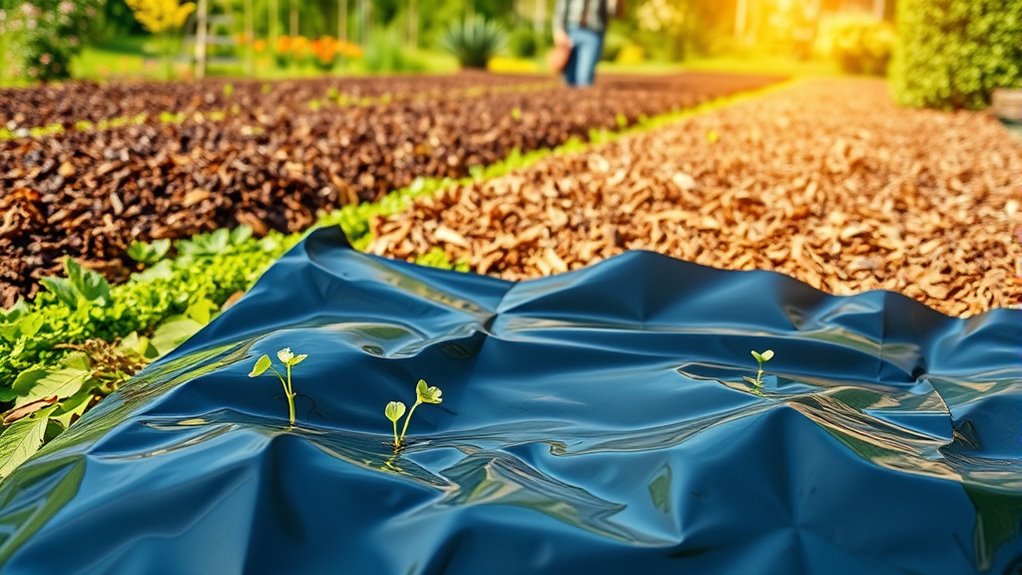
When I'm choosing mulch films, I always think about several key factors. The thickness and durability really matter, along with the type of material and its features. Plus, I can't ignore how well it controls weeds and its impact on the environment.
Thickness and Durability
Choosing the right thickness of mulch films can greatly impact your gardening success. I've found that thickness typically ranges from 0.5 mil to 6 mil. For effective weed control and moisture retention, I recommend at least a 1.5 mil thickness. Thinner films just can't handle environmental stressors. I prefer thicker options, around 3 mil or more, as they block sunlight efficiently and resist tearing during installation. High-quality polyethylene films enhance durability, resisting UV degradation and extreme weather, which is essential for longevity in my garden. It's critical to strike a balance—too thin and weeds thrive, too thick and you risk hampering soil temperature and moisture. Finding that perfect thickness is key to a flourishing garden.
Material Type and Features
After settling on the right thickness for your mulch films, it's time to contemplate the material type and its features. You'll find options like polyethylene, biodegradable plastics, and natural fibers, each with unique benefits for your soil health and the environment. Thicker films, ranging from 0.5 mil to 6 mil, offer better durability and weed suppression, but may not be as biodegradable. Consider UV stabilization, which protects your crops from harmful sunlight while preserving the film. Certain colors, like red or black, can enhance photosynthesis and warm the soil for specific plants. Finally, pay attention to permeability; some films have micropores that allow for aeration while still preventing weed growth, ensuring your garden thrives.
Sunlight Exposure Requirements
Understanding sunlight exposure requirements is essential for selecting the right mulch film for your garden. Different types of mulch films cater to varying light conditions, and choosing the right one can greatly influence plant growth. For instance, black mulch films absorb sunlight, warming the soil and benefiting many crops during the growing season. If you're growing sun-loving plants like strawberries or tomatoes, consider red mulch, which enhances light transmittance and increases temperature. Don't overlook UV stabilized films; they protect plants from harmful rays while still allowing adequate sunlight. Finally, remember that the thickness of the mulch film matters—thicker films provide insulation, while thinner options promote better light penetration. Make your choice wisely for a thriving garden!
Weed Control Effectiveness
While considering mulch films for your garden, it's crucial to evaluate their weed control effectiveness. I've found that mulch films effectively suppress weed growth by blocking sunlight, which weeds need to germinate. The thickness of the film matters; I prefer options that are at least 1.5 mil thick for better durability and weed barrier properties. Be cautious with biodegradable films, as they can break down in a month, letting weeds through if used alone. I also like colored films, like red, which not only suppress specific weeds but can boost crop yields, too. Finally, pre-cut holes in mulch films make planting easier while still controlling weeds, so I always look for that feature to streamline my gardening experience.
Biodegradability and Environmental Impact
As I explore mulch films for my garden, I'm increasingly drawn to biodegradable options due to their environmental benefits. These films break down naturally over time, considerably reducing plastic waste and minimizing my garden's environmental impact. I love that the degradation process involves natural microorganisms, converting the material into harmless byproducts without leaving toxic residues. Many biodegradable films are crafted from renewable resources, which helps lower the carbon footprint compared to synthetic plastics. Plus, as they decompose, they enhance soil health by returning organic matter, boosting microbial activity and nutrient availability. However, I've learned that their effectiveness for weed suppression and soil warming can vary, and I need to plan accordingly since their longevity is shorter than traditional plastic mulch.
Application and Installation Ease
When I choose mulch films for my garden, ease of application and installation is a top priority. I often look for films with pre-cut holes or designs that simply unroll, which cuts down on setup time and labor. Adjustable features are also a plus, allowing me to achieve ideal soil coverage without the hassle of cutting. I pay close attention to thickness, as thicker films resist tearing, especially in windy conditions. Additionally, I prefer films specifically designed for my needs, like those offering UV protection or moisture retention. Finally, lightweight and flexible options make it easier to handle, particularly in larger garden areas, enhancing my overall gardening experience.
Crop-Specific Suitability
After considering how easy mulch films are to apply and install, I now focus on how well they suit specific crops. Different crops have unique needs for light, temperature, and moisture, so choosing the right mulch film is essential for ideal growth. For instance, I've found that red mulch films work wonders for strawberries and tomatoes by reflecting light wavelengths that boost photosynthesis and fruit production. On the other hand, black mulch films excel at weed prevention and moisture retention, making them perfect for sun-loving vegetables. If you're eco-conscious, biodegradable options provide weed control while enriching the soil as they decompose. Don't forget about thickness; thinner films can tear easily and may not last an entire growing season.
Frequently Asked Questions
How Do Mulch Films Impact Soil Temperature?
I've found that mulch films can considerably impact soil temperature. They create a barrier that retains heat during cooler nights while preventing excessive heat during hot days. In my garden, I've noticed that using these films helps maintain a more consistent temperature, promoting healthier plant growth. By regulating soil temperature, I've seen improved seed germination and overall plant vigor. So, if you're gardening, consider how mulch films can help your plants thrive!
Can I Reuse Mulch Films for Multiple Seasons?
Absolutely, I can reuse mulch films for multiple seasons, but I've learned to inspect them first. If they're still intact and free from significant tears or degradation, they're good to go. I usually clean off any residue or dirt before storing them away. Just remember, the effectiveness may diminish over time, so I keep an eye on their performance each season to guarantee they still meet my gardening needs.
What Are the Best Practices for Applying Mulch Films?
When I first applied mulch films in my garden, I remember how the vibrant colors popped against the soil. To get the best results, I always make sure to lay the film flat, avoiding wrinkles that can trap water. I also trim it to fit my beds snugly, ensuring it covers the soil completely. Finally, I secure the edges with soil or stakes to prevent wind from lifting it. Trust me, it makes a huge difference!
Are There Any Health Risks Associated With Plastic Mulch?
I've often wondered about the health risks of using plastic mulch in my garden. While it's effective for weed control, there are concerns about chemicals leaching into the soil, especially if the mulch degrades over time. I always check for BPA-free options, as some plastics can release harmful substances. It's crucial to balance the benefits with potential risks, so I stay informed and choose wisely to protect my plants and my health.
How Do Biodegradable Mulch Films Break Down in the Environment?
I've found that biodegradable mulch films break down through natural processes like microbial activity, moisture, and temperature changes. They decompose into organic matter, enriching the soil while reducing waste. I've noticed that under the right conditions, these films can completely vanish within a growing season. It's fascinating how they contribute to sustainability in gardening, allowing me to cultivate my plants without the guilt of plastic pollution lingering in the environment.
Conclusion
As you explore the world of gardening with these mulch films, think of them as the protective cloak for your plants, shielding them from the harshness of the elements. Just like a devoted gardener nurtures their blooms, these films nurture the soil, ensuring a vibrant harvest. By choosing the right mulch, you're not only cultivating a garden but also sowing the seeds of sustainability and care for our planet. So, let your gardening journey flourish with this newfound knowledge!
